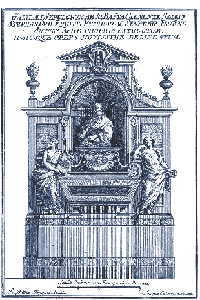
Text, design, and layout by Megan Wilde for the Electronic Text Center. This biography is based upon information culled from The Galileo Project website.
| Galileo and the Inquisition | |
| Galileo's belief in the Copernican System eventually got him into trouble with the Catholic Church. The Inquisition was a permanent institution in the Catholic Church charged with the eradication of heresies. A committee of consultants declared to the Inquisition that the Copernican proposition that the Sun is the center of the universe was a heresy. Because Galileo supported the Copernican system, he was warned by Cardinal Bellarmine, under order of Pope Paul V, that he should not discuss or defend Copernican theories. In 1624, Galileo was assured by Pope Urban VIII that he could write about Copernican theory as long as he treated it as a mathematical proposition. However, with the printing of Galileo's book, Dialogue Concerning the Two Chief World Systems, Galileo was called to Rome in 1633 to face the Inquisition again. Galileo was found guilty of heresy for his Dialogue, and was sent to his home near Florence where he was to be under house arrest for the remainder of his life. In 1638, the Inquisition allowed Galileo to move to his home in Florence, so that he could be closer to his doctors. By that time he was totally blind. In 1642, Galileo died at his home outside Florence. |  |
|
|
|
|
|
Text, design, and layout by Megan Wilde for the Electronic Text Center. This biography is based upon information culled from The Galileo Project website. |